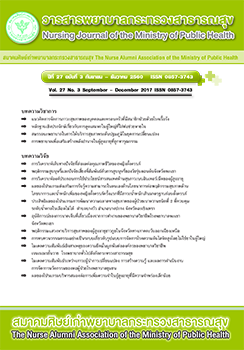A Concept of Health Management for an Individual and Families Who Have Members with Chronic Diseases
Main Article Content
Abstract
Currently, chronic diseases are increasing and the patients facing with suffering must adjust their behaviors accordingly in order to improve their health status. Families are social institutions that play an important role regarding the health and sickness of the family members. They are also an important part in supporting the patient to adapt and change their lifestyles, to continuously manage their health conditions, and to be able to access to healthcare facilities. As a result, the patients can live with their health conditions to as atisfactory level. The purpose of this article is to present the individual and family self-management theory as a guide to assist the families who have patients with chronic diseases. It is useful for both clinical practice and research.
Article Details
บทความและรายงานวิจัยในวารสารพยาบาลกระทรวงสาธารณสุข เป็นความคิดเห็นของ ผู้เขียน มิใช่ของคณะผู้จัดทำ และมิใช่ความรับผิดชอบของสมาคมศิษย์เก่าพยาบาลกระทรวงสาธารณสุข ซึ่งสามารถนำไปอ้างอิงได้
References
2. Wacharasin C, Phaktoop M, Sananreangsak S.Examining the usefulness of a Family Empowerment Program guided by the Illness Beliefs Model for families caring for a child with thalassemia. Journal of family nursing. 2015; 21(2):295-321.
3. Knafl KA, Deatrick JA. Further refinement of the family management style framework. Journal of Family Nursing. 2003; 9(3):232-56.
4. Knafl KA, Deatrick JA. Family management style and the challenge of moving from conceptualization to measurement. Journal of Pediatric Oncology Nursing. 2006; 23(1):12-8.
5. Friedman MM, Bowden VR, Jones E. Family nursing: Research, theory & practice: Pearson; 2003.
6. Ryan P, Sawin KJ. The individual and family self-management theory: Background and perspectives on context, process, and outcomes. Nursing outlook. 2009; 57(4):217-25. e6.
7. Ryan P. Integrated theory of health behavior change:background and intervention development. Clinical nurse specialist CNS. 2009; 23(3):161.
8. Chusri O, Family management in families of a child with thalassemia [Doctoral dissertation]. Chonburi Province: Burapha University; 2016
9. Chaiwong N, Duangpaeng S, Misingboon K.Factors influencing Self-management Behaviors among Acute Myocardial Infarction Patients. Thai Pharmaceutical and Health Science Journal. 2014; 9(3):112-9.(In Thai)
10. Boonmeesrisap A, Deena A, Chunlestskul K.Determinants of eating behavior of patients with Coronary Artery Heart Desease. The journal of Faculty of Nursing Burapha University. 2011;
17(3):41-53. (In Thai)
11. Grey M, Knafl K, McCorkle R. A framework for the study of self-and family management of chronic conditions. Nursing outlook. 2006; 54(5):278-86.
12. Whittemore R, Jaser SS, Jeon S, Liberti L, Delamater A, Murphy K, et al. An internet coping skills training program for youth with type 1 diabetes: six-month outcomes. Nursing research. 2012; 61(6):395.
13. Siriyupa S, Development of family management program for school age children with thalassemia (Doctoral Dissertation), Bangkok: Mahidol university. 2011.
14. Chusri O, Wannee Deoisres, Van Riper M.The styles of management in families having a child with thalassemia. SDU Research Journal. 2016; 9(3).

